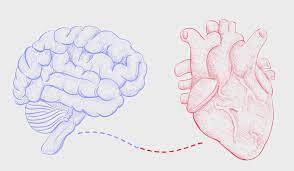Heart failure: An Important link with cognitive impairment.
Heart failure affects more than 64 million people globally. One of the most frequent complications in heart failure patients is cognitive impairment.
Heart failure may cause cognitive decline because, according to Columbia University researchers, there is a little calcium leak inside the brain’s neurons.

Additionally, researchers have created an investigational medication that aims to ‘plug’ the calcium leak and halt the course of heart failure.
Heart failure, an incurable cardiovascular disorder where the heart cannot effectively pump blood throughout the body, affects about 64 million people globally.
Complications include shortness of breath, arrhythmia, and kidney problems. Also, fluid retention in the lungs, belly, feet, and legs is more common in those with heart failure.
Additionally, one frequent complication in persons with heart disease is cognitive impairment.
A little calcium leak inside the brain’s neurons, according to Columbia University researchers, may be the reason heart failure can result in cognitive impairment.
In addition, researchers have created an experimental medication to “plug” the calcium leak and perhaps reduce the development of heart failure.
What is cognitive dysfunction?
Cognitive impairment is also known as mild cognitive impairment. It happens when a person struggles to perform routine tasks that call for mental abilities like memory and thought.
Cognitive disability examples include:
- forgetfulness
- missing events on the calendar
- not knowing how to travel to frequented locations
- difficulty understanding a talk
- decision-making challenges
- failure to follow through on commitments or directions
People who have modest cognitive impairment could also go through emotional changes like despair, anxiety, and rage.
Cognitive impairment can be brought on by a variety of conditions, including infections, prescription drugs, and other diseases.
A increased chance of developing other types of dementia, such as Alzheimer’s disease, exists in those with mild cognitive impairment.
How does brain dysfunction may affect cognition?
The team decided to investigate a potential link between heart failure and cognitive decline. Based on what they already knew about the ryanodine receptor type 2 (RyR2)/intracellular Ca2+ (calcium release channel), Dr. Andrew R. Marks, chair of the Department of Physiology & Cellular Biophysics at Columbia University Vagelos College of Physicians and Surgeons and lead researcher of this study explained.
Both the heart and the brain have the RyR2 channel, thus he said, “I reasoned that since the channel is leaky in the heart due to systemic stress of heart failure it might also be leaky in the brain.”
In heart muscle, there is an encoded protein called RyR2. It contributes to the delivery of that specific mineral to the cardiac muscles as a component of the intracellular calcium channel.
Calcium is essential for both heart and brain function, Dr. Marks noted. “Calcium is required to activate muscle contraction in the heart and for signaling in the brain.”
Testing the theory of the heart-brain relationship
Dr. Marks and his team tested their theory in this study using a mouse model. Researchers discovered that calcium leakage in the brain’s neurons caused cognitive impairment in rats with heart failure.
Scientists also looked at the brains of heart failure victims who had passed away. They looked at those brains and discovered leaky calcium channels, which may have contributed to cognitive impairment in those people.
Since heart failure is progressive, clinicians may want to closely examine their heart failure patients for cognitive impairment and keep track of this, according to Dr. Marks’ research. “The doctors could determine whether their patient’s cognitive impairment is affecting their capacity to comply with medical advice and take their medications.”
Are calcium leaks treatable by doctors?
Dr. Marks and his team discovered throughout the study that an investigational medication called Rycals created by Marks’ group. It could be used to “plug” the calcium leak and possibly delay the onset of heart failure.
“Rycals fix the leak in RyR channels and are in clinical trials at the Mayo Clinic and at the AMC in Amsterdam for an inherited form of exercise-induced sudden death,” stated Dr. Marks. In a year or two, depending on the outcome of this experiment, they might be available.
A broad unifying hypothesis?
About this study, Dr. Richard Wright, a cardiologist at Providence Saint John’s Health Centre in Santa Monica, California, who was not involved in the study, remarked.
He applauded the researchers for finally developing a comprehensive, all-encompassing theory of various disease states after years of research.
Dr. Wright said, “People with chronic heart failure are weak and have respiratory problems; this has long been known. As this article noted, they frequently exhibit cognitive impairment in comparison to their classmates.”
Here, Dr. Marks’ team is attempting to develop a unified theory to account for all these many changes that take place in heart failure patients, and I believe they have done so. Dr. Richard Wright stated, “I believe this idea that calcium excess is a unifying mechanism to explain not only the heart’s dysfunction but skeletal muscle dysfunction, diaphragm dysfunction, and as the article’s main thesis, brain dysfunction as well.”
The beginning of a new era is upon us.
Dr. Wright remarked that he was thrilled to learn of a substance created in the lab of the study team that has been demonstrated to favourably effect these alterations.
We are at the beginning of a new era, which I would refer to as the period of designer molecules, he remarked. “We’ve seen it in hypertrophic cardiomyopathy and amyloidosis already, where you can design molecules that change pathologic changes of proteins.”
They have compounds created in their lab to prevent alterations that help prevent calcium excess in neurons, heart cells, and skeletal muscle cells. This could have a significant impact on the results of our research.
Dr. Wright did point out that additional research is still required because the majority of the results in this article came from a mouse model.
Humans are not mice, he continued, so “sometimes we get misled.” However, they’ve done a great job of avoiding that and gone to the bother of using chunks of autopsied brains to support their claim, which I think is quite real.”
Other study limitations include the tiny number of human brains examined by the researchers and the fact that the study’s control group consisted of participants who were significantly younger than those who had suffered from heart failure and cognitive deterioration.
REFERENCES:
- https://www.medicalnewstoday.com/articles/how-can-heart-failure-contribute-to-cognitive-impairment
- https://www.healthline.com/health-news/how-a-heart-attack-can-cause-cognitive-decline-years-later
- https://www.ccjm.org/content/ccjom/74/2_suppl_1/S132.full.pdf
For Alzheimer’s disease medications that have been suggested by doctors worldwide are available here https://mygenericpharmacy.com/index.php?cPath=77_99
